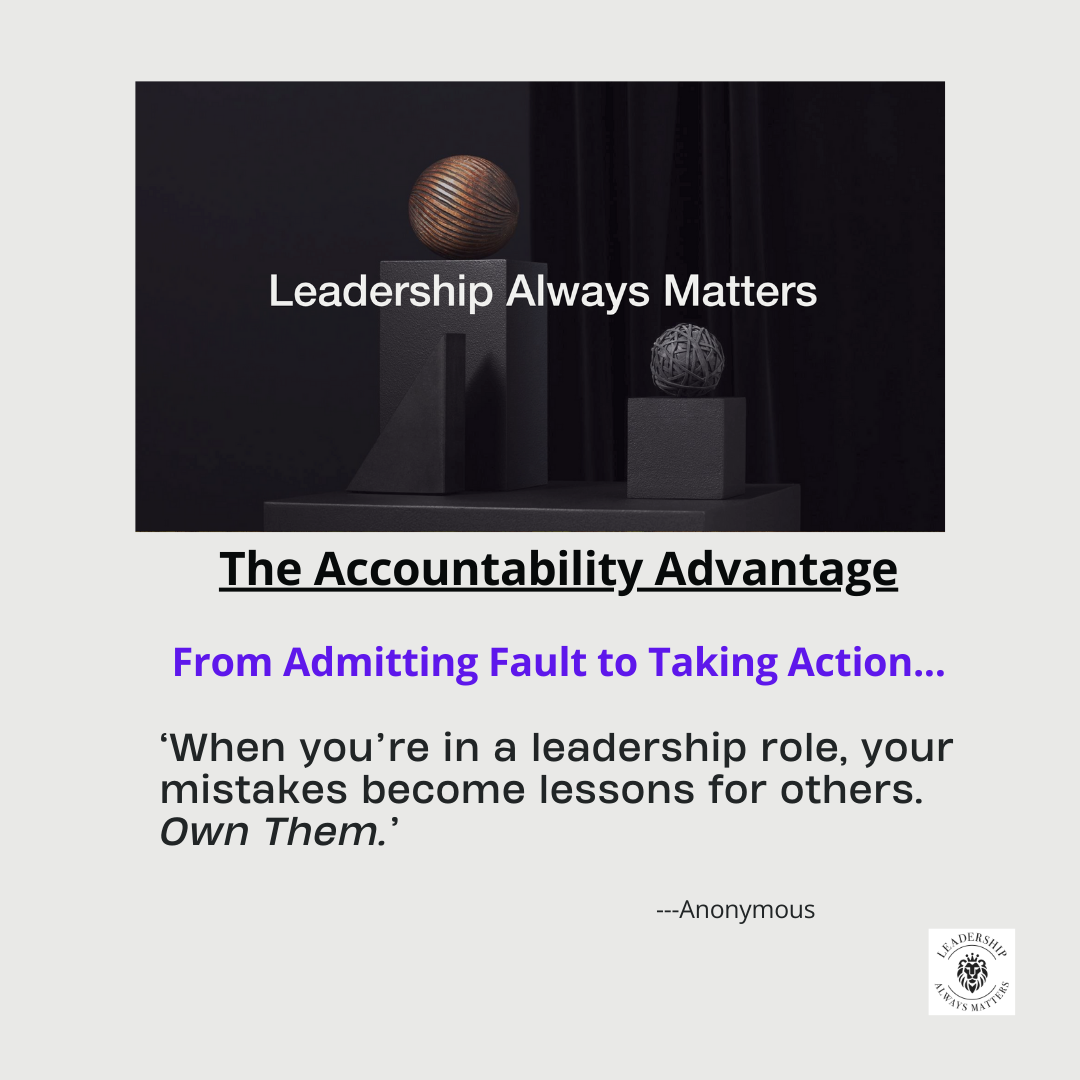Own It!—Admit Fault And Take Action
Before we begin…
If you’ve ever been in an uncomfortable situation, and you know it was your fault, but you just can’t admit it…you are not alone. It’s not easy to accept accountability. People have different reasons to avoid it, especially because admitting fault requires reflection and self-awareness.
Let’s Talk Leadership!
What you may not know about admitting fault, is that it’s only one part of accountability. True accountability is much more than that. It’s about taking ownership of your actions, learning from your mistakes, and being responsible—consistently.
How is leadership and accountability connected?
Without accountability you can easily become an ineffective leader because you lose credibility. On the other hand, when you are accountable, you inspire and set the tone by modeling it. It’s becomes easier to have long-term success.
Here’s more on how they’re connected:
Accountable Leaders:
Set the Standard
When you’re accountable you build trust and show integrity. Your actions show what accountability looks like in real life.
Build a Culture of Ownership
Empower others to take ownership of their decisions. They make sure everyone understands how their contributions matter.
Provide Feedback and Responsibility
Hold others accountable through regular feedback and constructive conversations. Accountable leaders make sure employees learn and grow from their mistakes.
Align Shared Goals
Help align personal accountability with the company’s mission. They connect leadership to company goals.
Why is it difficult to be accountable?
Sometimes being accountable is difficult because of personal factors, including fear of failure. Some leaders may want to protect their career. They think that admitting mistakes will make them appear incompetent. Others because of their ego and arrogance. They struggle to admit they are wrong and believe they are immune to consequences. Yet, other leaders just lack self-awareness. They fail to recognize their faults and avoid responsibility unintentionally. In the workplace, sometimes the lack of accountability happens when there is no clear system to track performance. It makes it easier for leaders to avoid taking responsibility.
Also true, is that leaders may have had poor role models. Maybe they were mentored by someone who avoided accountability. If that’s the case, they do the same thing without seeing the negative impact.
Do you know…
Former Enron Chairman, Kenneth Lay failed to take responsibility during the Enron fallout back in early 2000’s? He falsified financial reports, engaged in fraudulent accounting and other deceptive practices. Then when the fraud was exposed he refused to own up to his decisions and shifted the blame to others.
His lack of accountability caused the employees their jobs, pensions, and life savings. It’s a case that went down in history as one of the worst unethical case. It showed how leaders failed to be accountable and it led to widespread consequences.
Accountability
How can I learn to be more accountable?
Focus on building habits that encourage responsibility. For example:
Set Clear Expectations
Be clear in defining goals, responsibilities, and timelines. When everyone knows their role, it’s easier to track performance and own the outcomes.
Lead by Example
Show accountability through your actions. Admit mistakes, take responsibility for failures, and do not play the blaming game.
Track and Reflect on Decisions
Take ownership of lessons learned. Reflect on what went well, and what didn’t — this way you can document your decisions and results.
Communicate Transparently
Be open about challenges, decisions, and reasoning. When you communicate clearly, you build trust and accountability follows.
Develop Emotional Intelligence
If expectations aren’t met…acknowledge it and take corrective action. If you are consistent, you create a culture of accountability.
Overall, accountability is learned through practice, personal integrity, and a willingness to own your failures.
Have a good weekend!
—-Dr. Aguilar



